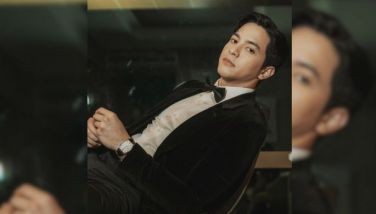The Doors: When the music is over
June 13, 2004 | 12:00am
Named after The Doors of Perception, a work by Aldous Huxley, this ’60s band led by Jim Morrison has the dubious distinction of being one of the most exciting, and simultaneously one of the most pretentious, groups in rock history. Equally sublime and silly, The Doors have been mythologized by fans beyond any rational understanding. Just scan the "appreciation" by hippie novelist T.C. Boyle in the liner notes to Legacy to glimpse of the problem: with all the clarity of a barely-recalled acid flashback, you can feel Boyle straining to attach significance to a blazing moment of his youth. You kind of had to be there, I guess.
But then again, Jim Morrison and his pals were more than just an LA bar band with poetic pretensions. They entered the rock game at a time when theater and cinema were becoming as much a part of youth culture as Sgt. Pepper and Monterey. Film students and beach bums before turning pro, The Doors turned out to be one of the most cinematic rock bands ever. First, there was the narrative unfolding of Jim Morrison’s rock dream: with self-references like Lizard King, Mr. Mojo Rising and other crypto-erotic tags at his fingertips, Morrison inhaled a blast of Rimbaud, Baudelaire and the Beats, and served up his own rock and roll soufflé: it was always in danger of collapsing under its own symbolic weight. Fortunately, the music, and the moment, kept it (more often than not) real.
This two-CD collection captures all the classics, throws in a few bunts and misses, and makes you wish the band had gone just a little further in their journey into rock’s heart of darkness.
Yes, it was Francis Ford Coppola’s Apocalypse Now (1979) that first revived Jim Morrison’s from rock-footnote status, and made him hot again. The evocative use of their 11-minute epic The End in the film showed just how convincing The Doors could be, when they were unfettered by bullshit and pomp. With snaky guitar lines and organ swirls, gently opening up to Morrison’s primal, Freudian narrative, it’s one of rock’s finest moments; time hasn’t touched this one a bit. As keyboardist Ray Manzarek builds up the frenzy, Robbie Krieger’s guitar stabs work the song into a snake charmer’s miracle: hypnotizing, mythic, then orgasmic. Cinematic, in fact.
More interestingly, the version on Legacy includes the restored vocal mix that was only used on the Apocalypse Now soundtrack: censored back in 1967, now you can hear Morrison egging the band on to a climax, barking out "Fu… fu… fu… yeah… come on…!" It’s an inclusion that changes the song’s meaning from murderous frenzy to petit mort: the little death of sexual release. The Doors may have never improved on the first album, the one with Light My Fire, Soul Kitchen, Break On Through and The End. But they went on kicking.
The second album, Strange Days, included psychedelic gems like When the Music’s Over, People Are Strange, Moonlight Mile and the title track. By that time, the mythos was already starting to unravel: Morrison was a pop star, a media idol (even appearing, famously, in Tiger Beat! magazine) and, increasingly, a drunk. His fascination with The Living Theater led him to challenge and confront his audiences, goading them to riot and occasionally flirting with public exposure himself onstage. Morrison got arrested so many times onstage that it must have seemed like part of the act.
A half-assed political posture existed behind Morrison’s musings. He sang about picking up guns on Five To One, but few thought the lounge-y Doors would ever lead a street revolution. Morrison once called himself an "erotic politician," and that’s a bit closer to his influence on youth culture. It was more of an attitude: leather pants, messed-up on drugs or booze, he would shrug and pout through each press appearance, rock’s embodiment of rebellion. A clown prince of darkness.
But the music suffered. By the time 1968’s Soft Parade came out, Morrison’s voice was shot to hell. The second disk of Legacy opens with Touch Me, one of The Doors’ most popular singles, and one of their most embarrassing. The tracks from that album only work when placed in an historical context: fortunately, Legacy does exactly that. You can see Morrison guiding the band back to truer, safer ground with the next release, Morrison Hotel, wearing his white blues on his sleeve. The music was better, and just when the band was reclimbing its way to respectability, they decided to go out quietly into the night: 1970’s somber LA Woman was a classic of FM radio formatting, with its misty-rain drive song, Riders on the Storm and other blues-and-poetry hybrids. Were The Doors now officially a lounge act? Morrison gave few clues, his voice no longer a reverbed, authoritative yelp, but kept low and mysterious in the mix. A few months later, he was found dead in a Paris bathtub, and was eventually buried at Pere Lachaise cemetery. Do The Doors still matter? Yes, in some strange, still undefinable way. There have been no others like them.
But then again, Jim Morrison and his pals were more than just an LA bar band with poetic pretensions. They entered the rock game at a time when theater and cinema were becoming as much a part of youth culture as Sgt. Pepper and Monterey. Film students and beach bums before turning pro, The Doors turned out to be one of the most cinematic rock bands ever. First, there was the narrative unfolding of Jim Morrison’s rock dream: with self-references like Lizard King, Mr. Mojo Rising and other crypto-erotic tags at his fingertips, Morrison inhaled a blast of Rimbaud, Baudelaire and the Beats, and served up his own rock and roll soufflé: it was always in danger of collapsing under its own symbolic weight. Fortunately, the music, and the moment, kept it (more often than not) real.
This two-CD collection captures all the classics, throws in a few bunts and misses, and makes you wish the band had gone just a little further in their journey into rock’s heart of darkness.
Yes, it was Francis Ford Coppola’s Apocalypse Now (1979) that first revived Jim Morrison’s from rock-footnote status, and made him hot again. The evocative use of their 11-minute epic The End in the film showed just how convincing The Doors could be, when they were unfettered by bullshit and pomp. With snaky guitar lines and organ swirls, gently opening up to Morrison’s primal, Freudian narrative, it’s one of rock’s finest moments; time hasn’t touched this one a bit. As keyboardist Ray Manzarek builds up the frenzy, Robbie Krieger’s guitar stabs work the song into a snake charmer’s miracle: hypnotizing, mythic, then orgasmic. Cinematic, in fact.
More interestingly, the version on Legacy includes the restored vocal mix that was only used on the Apocalypse Now soundtrack: censored back in 1967, now you can hear Morrison egging the band on to a climax, barking out "Fu… fu… fu… yeah… come on…!" It’s an inclusion that changes the song’s meaning from murderous frenzy to petit mort: the little death of sexual release. The Doors may have never improved on the first album, the one with Light My Fire, Soul Kitchen, Break On Through and The End. But they went on kicking.
The second album, Strange Days, included psychedelic gems like When the Music’s Over, People Are Strange, Moonlight Mile and the title track. By that time, the mythos was already starting to unravel: Morrison was a pop star, a media idol (even appearing, famously, in Tiger Beat! magazine) and, increasingly, a drunk. His fascination with The Living Theater led him to challenge and confront his audiences, goading them to riot and occasionally flirting with public exposure himself onstage. Morrison got arrested so many times onstage that it must have seemed like part of the act.
A half-assed political posture existed behind Morrison’s musings. He sang about picking up guns on Five To One, but few thought the lounge-y Doors would ever lead a street revolution. Morrison once called himself an "erotic politician," and that’s a bit closer to his influence on youth culture. It was more of an attitude: leather pants, messed-up on drugs or booze, he would shrug and pout through each press appearance, rock’s embodiment of rebellion. A clown prince of darkness.
But the music suffered. By the time 1968’s Soft Parade came out, Morrison’s voice was shot to hell. The second disk of Legacy opens with Touch Me, one of The Doors’ most popular singles, and one of their most embarrassing. The tracks from that album only work when placed in an historical context: fortunately, Legacy does exactly that. You can see Morrison guiding the band back to truer, safer ground with the next release, Morrison Hotel, wearing his white blues on his sleeve. The music was better, and just when the band was reclimbing its way to respectability, they decided to go out quietly into the night: 1970’s somber LA Woman was a classic of FM radio formatting, with its misty-rain drive song, Riders on the Storm and other blues-and-poetry hybrids. Were The Doors now officially a lounge act? Morrison gave few clues, his voice no longer a reverbed, authoritative yelp, but kept low and mysterious in the mix. A few months later, he was found dead in a Paris bathtub, and was eventually buried at Pere Lachaise cemetery. Do The Doors still matter? Yes, in some strange, still undefinable way. There have been no others like them.
BrandSpace Articles
<
>
- Latest
- Trending
Trending
Latest
Trending
Latest
Recommended































